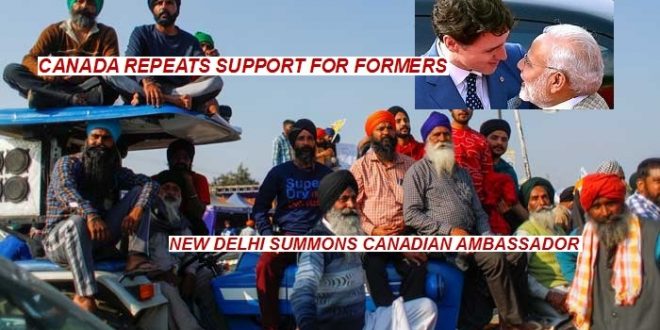10-12-2020
By SJA Jafri + Bureau Report + Agencies
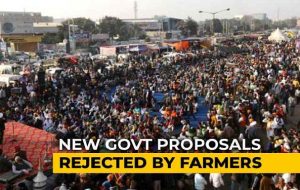 NEW DELHI/ OTTAWA/ ISLAMABAD: The Indian government’s offer to amend three laws in a set of new agricultural rules that has led to weeks of protests was rejected by farmers on Wednesday, who vowed to intensify demonstrations.
NEW DELHI/ OTTAWA/ ISLAMABAD: The Indian government’s offer to amend three laws in a set of new agricultural rules that has led to weeks of protests was rejected by farmers on Wednesday, who vowed to intensify demonstrations.
The farmers maintained that they seek the withdrawal of the laws which they said would harm their economic interests while helping big food retailers.
Farmers have been demonstrating since late last month over reforms enacted 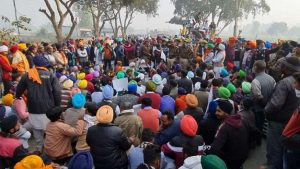 in September that loosened rules around the sale, pricing and storage of farm produce, that had protected farmers from an unfettered free market for decades.
in September that loosened rules around the sale, pricing and storage of farm produce, that had protected farmers from an unfettered free market for decades.
“The farmers have rejected the government’s proposals,” Darshan Pal, president of Krantikari Kisan Union, told reporters after the meeting of over 30 farmers’ unions.
Farmers’ leaders said they would intensify nationwide protests from Saturday 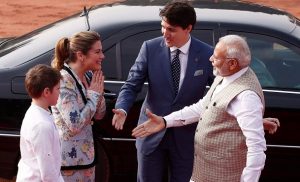 that would include boycott of the leaders of Modi’s ruling party, blocking of national highways and picketing at toll plazas.
that would include boycott of the leaders of Modi’s ruling party, blocking of national highways and picketing at toll plazas.
Expressing their anger towards some large domestic corporations and retailers, including Reliance Industries and Adani Enterprises, farmer leaders said they would boycott the products and services of these companies.
There was no immediate comment from both the companies.
The majority of farmers believe the news laws could pave the way for some of 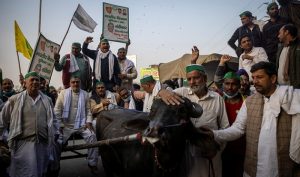 India’s leading corporations to enter the Indian agriculture trade, leaders said.
India’s leading corporations to enter the Indian agriculture trade, leaders said.
In a separate statement, Adani Group said the company had no role in the direct purchase or sale of the farm produce, and was only hired by the government agencies for storage of the produce.
Earlier, Indian government officials looked for ways to tweak new laws liberalizing the agricultural sector, after they put off a second day of talks with 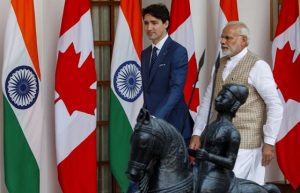 farmer organizations that have mobilized mass protests.
farmer organizations that have mobilized mass protests.
Small growers, in particular, fear that they will be at the mercy of big business if they are no longer assured of floor prices for staples such as wheat and rice sold at government-controlled wholesale markets.
Unhappy with Prime Minister Narendra Modi’s liberalization, farmers have set up protest camps and blocked roads surrounding the capital New Delhi, and on Tuesday mounted a nationwide strike.
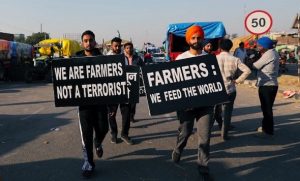 Farmer leaders want the government to retain mandatory government purchases, and said buyers at private markets should pay the same tax as at state-run markets.
Farmer leaders want the government to retain mandatory government purchases, and said buyers at private markets should pay the same tax as at state-run markets.
The protests, led by influential farming groups from the grain-producing states of Haryana and Punjab, pose a major challenge to Modi as he seeks to reform the vast agriculture sector, which makes up nearly 15% of India’s $2.9 trillion economy and employs around half of its 1.3 billion people.
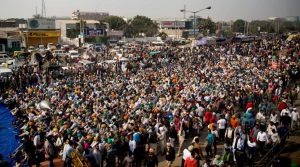 Opposition parties criticized the reforms, saying they would benefit big business and be disastrous for the rural economy, and met President Ram Nath Kovind, the country’s ceremonial head of state, urging him to ask the government to accept farmers’ demands.
Opposition parties criticized the reforms, saying they would benefit big business and be disastrous for the rural economy, and met President Ram Nath Kovind, the country’s ceremonial head of state, urging him to ask the government to accept farmers’ demands.
Meanwhile, Indian government and farmer leaders to hold new round of talks next week, while Canadian PM Justin Trudeau once again voices backing for 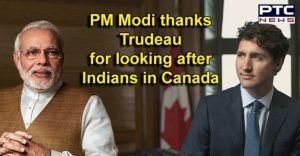 protesting farmers despite New Delhi’s warning against “interference”.
protesting farmers despite New Delhi’s warning against “interference”.
Tens of thousands of Indian farmers have continued protests as their leaders completed another round of failed talks with government officials to discuss a blockade of key highways leading to the capital New Delhi by angry farmers over new farm laws.
The fifth round of talks ended on Saturday without a breakthrough with both 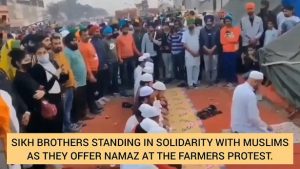 sides agreeing to hold another round of negotiations on Wednesday, local media reported.
sides agreeing to hold another round of negotiations on Wednesday, local media reported.
Furthermore, India says it has summoned the Canadian High Commissioner in Delhi to protest against comments made by Prime Minister Justin Trudeau about the ongoing farmers’ protests outside the Indian capital.
Tens of thousands of protesters have marched upon Delhi from farms in 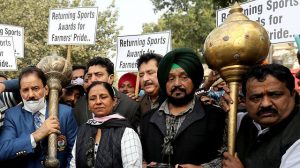 neighboring states of northern India to criticize new reforms that will open up the agricultural sector to privatization and market forces. Trudeau said earlier this week that the situation was “concerning” and that Canada would always “defend the right to peaceful protest”.
neighboring states of northern India to criticize new reforms that will open up the agricultural sector to privatization and market forces. Trudeau said earlier this week that the situation was “concerning” and that Canada would always “defend the right to peaceful protest”.
A spokesperson for the Indian government said Trudeau’s comments “constitute an unacceptable interference in our internal affairs”. “Such actions, if continued, would have a seriously damaging impact on ties between India and Canada,” they said.
 Pressmediaofindia
Pressmediaofindia
